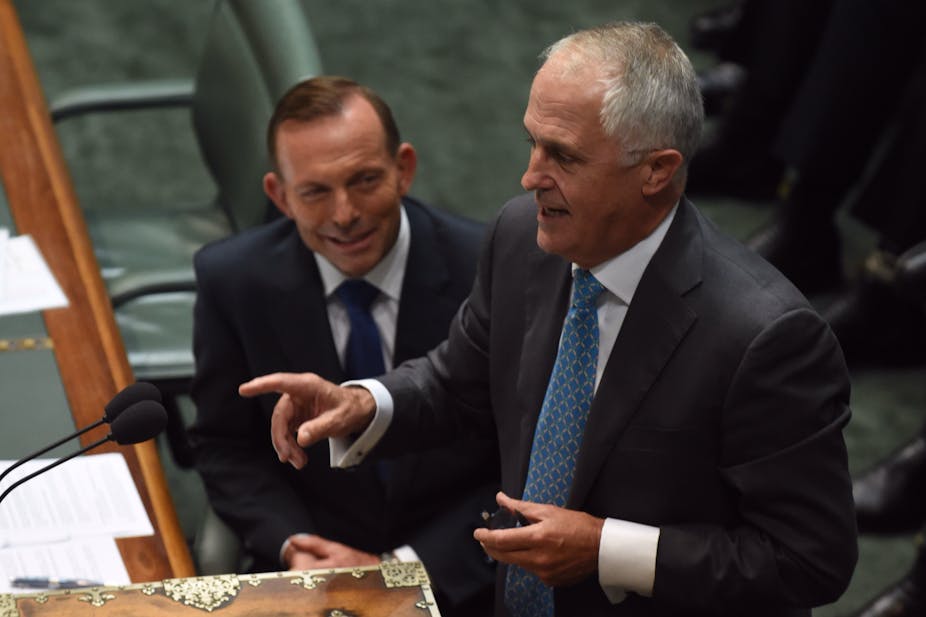Those of us who study politics are fortunate, but also unfortunate, to work in an academic field whose terms are widely used and abused in public debate. “Populist”, which I’ve written about here, is one label that op-ed writers and think-tankers throw around like confetti at a wedding with little thought for what it actually means. Another is “charismatic”.
While following the recent travails of Australian Prime Minister Tony Abbott, I’ve seen his possible successor, Malcolm Turnbull, frequently described as “charismatic”. This is mainly based on – in addition to not being Tony Abbott – Turnbull appearing confident and urbane, speaking well on television and being a very rich “self-made man”.
But does that make Turnbull a “charismatic leader”? Not necessarily. If we go back to the original definition of “charisma” by German sociologist Max Weber, we find it is not how leaders present themselves or perform in public, but how they are perceived by their followers that determines whether we can call them “charismatic” or not.
In other words, we should be looking at the reactions of followers to leaders when deciding if a charismatic relationship is present. But what should we be looking for in those reactions?
Several key features are stressed by scholars of charisma. Followers believe the leader is “on a mission”; they think the leader possesses “unique powers”; they express “unconditional acceptance” of the leader’s authority; and, usually, they affirm a strong emotional commitment to the leader.
With that in mind, we can ask: are all so-called “charismatic leaders” really charismatic? I investigated this in a recent Political Studies article. It was based on interviews in Italy and Switzerland between 2009 and 2011 with more than 100 elected representatives and grassroots members of parties whose leaders were said by both the media and fellow academics to be “charismatic”.
These leaders were Silvio Berlusconi of the People of Freedom/Forza Italia, Christoph Blocher of the Swiss People’s Party and Umberto Bossi of the Northern League.
What I found was that although there were similarities in how the three leaders were viewed by those in their parties, there were also important differences. Bossi’s was a paradigmatic case of charisma. Many interviewees claimed he had a political vision far superior to anyone else. As one put it:
He is a prophet, not just a politician.
These qualities meant that, as a grassroots member said to me:
We have blind faith in him. Whatever he decides is fine with us.
Another said that Bossi was the only one who was “completely loved” in the party. Bossi was considered by those I interviewed to have unique qualities; he was believed to be on a mission; his authority was unquestioned and an intense emotional attachment was clearly present.
The case of Berlusconi was slightly less clear-cut. Interviewees said that he was on a mission to save Italy and had many unique qualities. They also accepted his authority unconditionally. However, this acceptance seemed based not so much on their appreciation of his qualities or an emotional attachment, but on the recognition that the party was his creation and possession. As one interviewee told me, Berlusconi:
… decides the party stances whether you like it or not. If you like it, you stay. If you don’t, you leave. That is really clear.
This, incidentally, was stressed as being a good thing since it gave the party decisive leadership. However, that everything revolved around Berlusconi and little had been done to build lasting structures also meant that more than half of those I spoke to had doubts the party would survive beyond the leader’s political lifespan – something that, despite their attachment to Bossi, none of those in the Northern League had said about their party’s future. Berlusconi’s party was first and foremost a personal party.
Finally, Christoph Blocher offered the weakest case for definition as a “charismatic leader”. He was recognised by interviewees as possessing unique qualities and many stressed that he was an excellent strategist who, like Bossi, possessed a political vision which others did not. He also, like Berlusconi, was said to have a “common touch”, despite being a rich and talented “self-made man”.
Reflecting an opinion widely expressed, one interviewee said:
For me, he is the complete man.
However, Blocher’s authority was certainly not unconditionally accepted and nor was any great emotional attachment expressed. Several interviewees criticised the media for depicting him as being more powerful within the party than was really the case. Another said simply that:
I do not think it is a good idea to have highly charismatic figures overshadowing a party.
Finally, while acknowledging his abilities, none thought the party would suffer unduly whenever Blocher leaves politics.
What emerges from this research is that even those leaders which have been most frequently described as “charismatic” may not be so. Or, at least, they and their followers may present the features of a charismatic relationship to very different degrees.
As for Malcolm Turnbull, it seems likely that his ability to gain new followers within the party room depends far less on any new-found recognition of his unique qualities or undisputed authority, and far more on their belief that he might just help them to save their seats.
The article on which this post is based, Populist Leaders and Coterie Charisma, can be downloaded for free until March 15, 2015.

